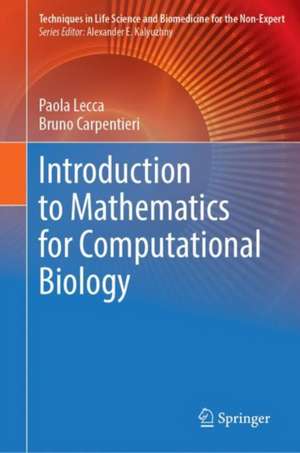Introduction to Mathematics for Computational Biology: Techniques in Life Science and Biomedicine for the Non-Expert
Autor Paola Lecca, Bruno Carpentierien Limba Engleză Hardback – 13 sep 2023
Preț: 786.18 lei
Preț vechi: 958.76 lei
-18% Nou
Puncte Express: 1179
Preț estimativ în valută:
150.43€ • 157.06$ • 124.50£
150.43€ • 157.06$ • 124.50£
Carte tipărită la comandă
Livrare economică 04-18 aprilie
Preluare comenzi: 021 569.72.76
Specificații
ISBN-13: 9783031365652
ISBN-10: 3031365658
Pagini: 264
Ilustrații: X, 264 p. 40 illus., 30 illus. in color.
Dimensiuni: 155 x 235 mm
Greutate: 0.56 kg
Ediția:1st ed. 2023
Editura: Springer International Publishing
Colecția Springer
Seria Techniques in Life Science and Biomedicine for the Non-Expert
Locul publicării:Cham, Switzerland
ISBN-10: 3031365658
Pagini: 264
Ilustrații: X, 264 p. 40 illus., 30 illus. in color.
Dimensiuni: 155 x 235 mm
Greutate: 0.56 kg
Ediția:1st ed. 2023
Editura: Springer International Publishing
Colecția Springer
Seria Techniques in Life Science and Biomedicine for the Non-Expert
Locul publicării:Cham, Switzerland
Cuprins
1. Introduction to graph theory.- 2. Biological networks.- 3. Network inference for drug discovery- 4. Introduction to differential and integral calculus.- 5. Modelling chemical reactions.- 6. Reaction-diffusion systems.- 7. Linear algebra background.- 8. Regression.- 9. Cardiac electrophysiology.-
Notă biografică
Paola Lecca, Assistant Professor, Faculty of Engineering, Free University of Bozen-Bolzano, Italy
Bruno Carpentieri, Associate Professor, Faculty of Engineering, Free University of Bozen-Balzano, Italy
Textul de pe ultima copertă
This introductory guide provides a thorough explanation of the mathematics and algorithms used in standard data analysis techniques within systems biology, biochemistry, and biophysics. Each part of the book covers the mathematical background and practical applications of a given technique. Readers will gain an understanding of the mathematical and algorithmic steps needed to use these software tools appropriately and effectively, as well how to assess their specific circumstance and choose the optimal method and technology. Ideal for students planning for a career in research, early-career researchers, and established scientists undertaking interdiscplinary research.
Caracteristici
Provides the foundation to design, execute, and interpret data analysis tools in biomedical research Covers mathematical background and practical applications Key resource for students and researchers focused on systems biology and drug design/discovery











